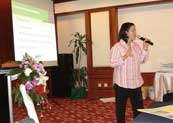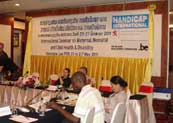
|

|
|
Home Learnings from MID-BCC: End of Project Materials FHI360 Bangkok Project Office: Learn About Us About The MID-BCC Project Blog Materials Communications Research Training/Capacity Building Advocacy/Policy Malaria Dengue Fever Avian and Pandemic Influenzas Other Infectious Diseases Innovations Risk Communication Updates and News Clips Partners/Resources Spotlight Archive Contact Us PreventProject.org AI.COMM h1n1vax.aed.org Follow @MIDBCC |
Mobile Phone Technology Helps to Monitor Disease Outbreaks and Health Behaviors in Lao PDR
Use of mobile phones to communicate with family, friends and coworkers, especially in the provincial capitals and some district towns, is becoming more the norm in Lao PDR. Now, thanks to the Mekong Behavior Change and Communication (MID-BCC) project funded by USAID the application of mobile phones application has gone a step further, helping health officials to monitor public health initiatives and disease outbreaks. Beginning in November 2010, AED (and its partner, Rapid Asia) set up a rapid response mechanism to monitor health programs atcross-border sites. MID-BCC capitalized on its existing partnership with the Lao Women's Union (LWU), whose members had previously been involved with efforts to prevent avian flu and deploy vaccines for the H1N1 influenza virus. A total of 17 LWU members from several villages in and around Vientiane, Savannakhet, Luang Namtha and Bokeo were recruited and trained to use the mobile phone/SMS-based program. They would serve as "master trainers" who would then, in turn, return to their cities and towns and train additional members. Overall, 71 participants were successfully recruited and trained.
During their training workshops, the women were educated about infectious diseases in general, the role of LWU in managing emerging infectious diseases, the mechanics of the mobile phone panel, and for master trainers, how to recruit others. After the participants' mobile phones had been successfully connected to the internet, they had to register to the panel online and complete a test survey. During registration, essential panel member information was collected for the panel database including name, phone number, service provider and location. They then worked through the process of data capture to ensure that they could gather and report back information without a hitch. Four "waves" of data collection were conducted. For each wave, the first SMS link was sent out early on Monday morning, and additional
panel participants were recruited by the Master Trainers after each wave, as needed.
Read more about SMS-based activities. |
|
|
Copyright© 2011 FHI360 1825 Connecticut Avenue NW Washington, DC 20009 - 5721  The Mekong Infectious Disease Behavior Change and Communication Project is funded by the United States Agency for International Development (USAID)/Global Health under Client Associate Award Number GHN-A-00-09-00002-00 under Leader Award (C-Change) No. GPO-A -00-07-00004-00 and managed by FHI 360. The information provided on this site is the responsibility of FHI 360 and is not official information from the U.S. Government and does not represent the views or positions of USAID or the U.S. Government. |
||
 The main criteria for involvement were relatively simple: participants had to have a GPRS-enabled mobile phone with service by either LTC,
ETL or TIGO -- the three largest mobile service providers in Lao. They also had to be willing to help monitor public health initiatives
both for human and animal health, monitor animal deaths and cases of sick animals, and provide input on health-seeking and health-reporting
behaviors, as well as which types of support materials they deemed most useful.
The main criteria for involvement were relatively simple: participants had to have a GPRS-enabled mobile phone with service by either LTC,
ETL or TIGO -- the three largest mobile service providers in Lao. They also had to be willing to help monitor public health initiatives
both for human and animal health, monitor animal deaths and cases of sick animals, and provide input on health-seeking and health-reporting
behaviors, as well as which types of support materials they deemed most useful.